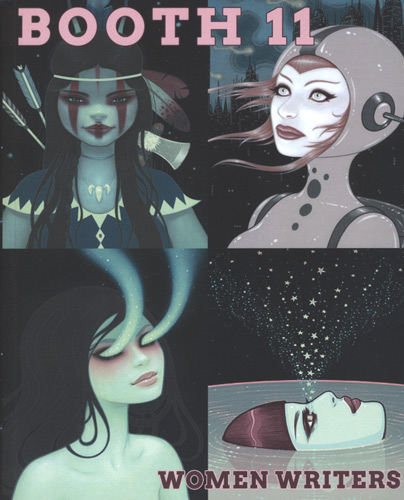Booth – 2018
Booth 11, the Women Writers issue, began, arguably, with male tears. In his introductory letter, Editor Robert Stapleton details an email he received after the 2015 Booth Poetry Prize shortlist was announced, in which a particularly entitled male noted: “Eight of your ten finalists are women. Is this gender bias or chance?” Stapleton kept his cool, explained the process dispassionately, and used the experience for growth. Prior to that email, he notes, two-thirds of the editorial staff at Booth had been men. Since then, the numbers have balanced as more than half of the journal’s editorial positions have been filled by women. Stapleton realized there was more he could do. “American history is dominated by the patience of women,” he writes, “and the world of American publishing, a garden of so much culture and progressive thought, should have been leading this charge long ago.”
Booth 11, the Women Writers issue, began, arguably, with male tears. In his introductory letter, Editor Robert Stapleton details an email he received after the 2015 Booth Poetry Prize shortlist was announced, in which a particularly entitled male noted: “Eight of your ten finalists are women. Is this gender bias or chance?” Stapleton kept his cool, explained the process dispassionately, and used the experience for growth. Prior to that email, he notes, two-thirds of the editorial staff at Booth had been men. Since then, the numbers have balanced as more than half of the journal’s editorial positions have been filled by women. Stapleton realized there was more he could do. “American history is dominated by the patience of women,” he writes, “and the world of American publishing, a garden of so much culture and progressive thought, should have been leading this charge long ago.”
Issue 11 is bright, fresh, and well-designed. The front and back covers feature a number of the edgy, mythic, and magical women prevalent in the work of contemporary artist Tara McPherson, whose paintings have graced the cover of Hi-Fructose and been featured in galleries around the world. The content of the writing within is varied, but themes emerge. Among them: birth, oceans, and assault. The stories and poems resonate with one another, magnifying love and hurt, as well as the cycles that connect them.
“Motherlode,” a flash nonfiction piece by Brenna Womer, is a power punch early in the issue. “I want to be a mother before my daughter learns what she is to the world, before she gets angry at me for telling her the way things are, for breaking that beautiful spell as my own mother did,” Womer writes. “I want to be a mother before I hate my son for what’s between his legs: the soft, pillowy flesh he’ll learn to wield like a sword.”
Later, the poetry takes over, full of confident language. “I scissor-kicked beyond the 3-D loom of the cliffs, listening to the water sigh against sandstone,” H.K. Hummel writes in “Yesterday’s Bestiary for Tomorrow.” Sarah Dalton’s contribution to the issue “In Defense of Being the Other Woman” is about excuses, about moving on. Right away, her protagonist declares, “There are only a few things I’m not proud of: knuckle tattoos and the nights you smelled like matrimony.”
Cathy Ulrich’s short story “Cliffs of Tojinbo” is clever and captivating. Her protagonist, gender-ambiguous through the first-person telling, imagines herself (or himself) as an English-speaking temporary worker living with a boyfriend in a small Japanese apartment. On a day off, this protagonist travels to Tojinbo, a long stretch of cliffs, to stare out at the sea. There, she meets a kindly, older man she dubs Tanigawa, who believes she has come to jump to her death. Of course, everything is possible in this hypothetical world, and the story implies, tonally, that Tanigawa might have been right.
Departing from the melancholic undertones of its predecessor, the hysterically funny “Whale Watch Chaperone Application 17.B” by Kaityln Andrews-Rice takes readers to a near-future world in which “fully aquatic placental marine mammals,” dubbed “TRUE WHALEs,” have gone extinct and been replaced by human-engineered WhaleSynths™ for educational purposes. It is nigh impossible to read the piece without thinking of the fast-paced, manic, darkly comedic writing of George Saunders, whose work has suddenly found a spiritual twin.
The fiction stays compelling, diverse in style and content alike. “The Giant’s Needle” by Allison Wyss is a smooth and disturbing piece of new mythology, a story of a daughter’s demands and the futile acts of sons. Following it is Katie Young Foster’s beautifully written, sad yet charming story titled “Rehearsed,” which follows a friendship bound by loss and new life, a present haunted by the past.
Also included are a number of great author interviews, four of which were made possible by the Vivian S. Delbrook Visiting Writers Series at Butler University. Two standouts are the conversations with Emily St. John Mandel (file the books under “M”), which centers around identity and craft, and the interview with Joyce Carol Oates, who seems impatient with her interviewer and has some daggers to throw at young adult writing and her former student, Jennifer Weiner, a bestselling author who craves a greater literary reputation. To writers wanting the best of both worlds, Oates says, simply and provocatively, “If you want enormous bestsellers, you can’t write difficult novels.”
Booth 11, and Booth generally, is a treasure. As this celebration of women writers illustrates, there is an enormous amount of talent in this world, and to diminish half of it is to diminish ourselves. It is up to people in positions of power to elevate the best writers, regardless of gender or sex, and to address their own shortcomings. To the disgruntled writer who emailed him several years ago, Robert Stapleton says, “Your legacy is greater than you know.” In that spirit, may the bitter, anonymous male writers of the world stay anonymous, and may great writing find its way into the light.
[booth.butler.edu]





